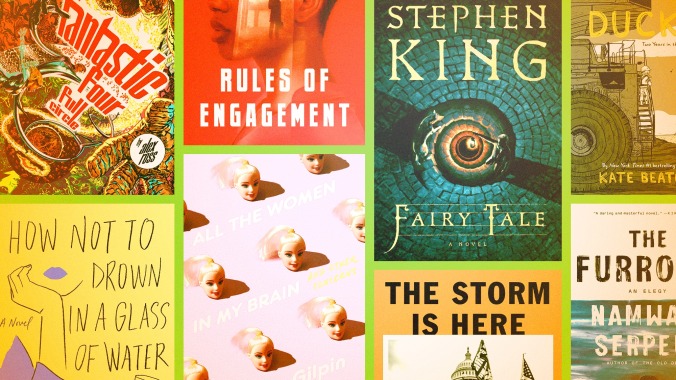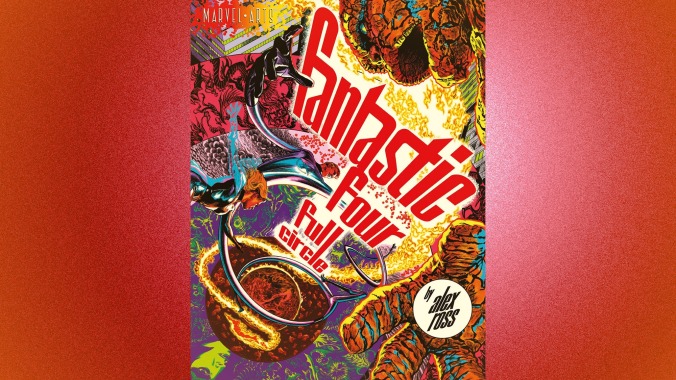10 books you should read in September, including Stephen King’s Fairy Tale and Alex Ross’ Fantastic Four: Full Circle
Also check out All The Women In My Brain And Other Concerns, a candid collection of personal essays from Emmy Award-nominated actress Betty Gilpin
Books News Fairy tale
Clockwise from bottom left: How Not To Drown In A Glass Of Water (Image: Macmillan); Fantastic Four: Full Circle (Image: Abrams ComicArts); Rules Of Engagement (Image: Berkley Books); Fairy Tale (Image: Scribner), Ducks (Image: Drawn & Quarterly); The Furrows (Image: Hogarth); The Storm Is Here (Image: Penguin Press); All The Women In My Brain And Other Concerns (Image: Flatiron) Graphic: Libby McGuire
Every month, a deluge of new books comes flooding out from big publishers, indie houses, and self-publishing platforms. To help you navigate the wave of titles arriving in September, The A.V. Club has narrowed down the options to 10 books we’re most excited about, including a trope-twisting dark fantasy novel from horror master Stephen King, an interdimensional journey through the Negative Zone with Marvel’s original superhero squad, and a collection of comical musings from GLOW star Betty Gilpin.

29 Comments
Is it being overly pedantic to question whether a 64-page story can really qualify as a “graphic novel”?
Maybe more pedantic than pointing out that an 11 year old cannot have an “affair,” unbalanced or otherwise.
From what I can tell as a result of a brief internet search, the novel at least shows that relationship as causing the protagonist trauma that he has to try to deal with, but calling it an “unbalanced affair” in a review does strike me as downplaying it considerably.
64 pages is decently long for a graphic novel. Or I’ll say, it’s efficiently adequate. It’s hard to say, right?For reference, I offer this:This whole thing, 32 pages. Two stories. But the effectiveness of those stories in a dozen pages is phenomenal. You can google the author and book and read it yourself. I loved it so much I supported that shit and bought the actual book. Up to you if you wanna do the same.My point: a good story is a good story, length ain’t got shit to do with it. It’s like that one sentence story: The last man on Earth was seated at his desk when there was a knock at his door.
My point: a good story is a good story, length ain’t got shit to do with it.I’ll agree wholeheartedly with that sentiment; Bradbury’s “There Will Come Soft Rains” is one of my favorite works of literature, and can be read in, what, 10 minutes tops? It’s still a short story rather than a novel, though.
I get ya, though.I am sort of curious what the requirements for a graphic novel are. Like is it just an acclaimed comic book? Can you write a graphic novel, or does it only become one after the fact? Like you write a comic book, but it’s considered a graphic novel 12 years later.
There are no requirements. You can have comics that come together in a book, an illustrated book that was never a comic, or even a book with illustrations in it. It can be long. It can be short. No Minimum. No Maximum. It can be terribly illustrated or can be wondrous to behold.The one thing you have in common for them all is a desire to read and enjoy it. Anyone that scoffs at them are doing themselves a tremendous disservice as some of the best writers today in any format miss out by dismissing them as ‘simply comics’ (and believe me – there are plenty of those jackasses out there)
I am sort of curious what the requirements for a graphic novel are.Well, what are the requirements of a feature film? AMPAS says it’s a minimum of 40 minutes; the Screen Actors Guild says the minimum is 80 minutes. I suspect most people, if asked, would give a minimum between 60 and 80 minutes. There’s more or less a rough idea, but not a universally-agreed-upon definition.When it comes to written works, I suspect there’s even less agreement; after all, it’s not like the ALA has said that, e.g., anything under 30 pages is a short story, anything over 100 pages is a novel, and anything in between is a novella. And, of course, even the definition of “page” isn’t really fixed. I think the numbers I gave are reasonable, but I could be convinced otherwise.As for comics and other sequential arts, I’d generally double the page counts for those definitions, but in this art form “page” is an even vaguer construct. Scott Morse’s Southpaw is over 120 pages, but because of its size and the fact that every page is a single panel, I hesitate to classify it as a graphic novella; whereas I think it’s fair to classify Art Spiegelman’s Maus and Maus II each as graphic novels even though combined they’re under 300 pages. I suspect that Fantastic Four: Full Circle, given its length and page size, would fit my nebulous definition of a graphic novella. And, just to reiterate, the story’s length and whichever umbrella term I think best fits it have no bearing on how good it is or how much I enjoy it; I looked up the book and author you posted in your earlier comment and read the two stories mentioned on the cover, and they are, indeed, terrific, as rich in emotion as they are spare in construction.P.S., since I suspect the question may cross your mind: I’d call Zot! Online: Hearts and Minds a graphic novella.
An 11 year old can’t have an “affair.” An 11 year old is sexually abused. I can’t believe I have to say this in 2022. Please publish a correction.
Humm…the newest King stuff I’ve bought is the Gwendy series, which was actually pretty good. Plus Eyes of the Dragon is one of my favorites. I may very well have to give his new one a try.
Duma Key is pretty good if you ain’t read it.
The last couple of books of his that I read, Billy Summers and Mr. Mercedes, I thought were pretty bad. Paper thin characters and not much plot wise, honestly made me think of the bestsellers you would find in airport bookstores. I’m a little wary of any his output after plodding through those.
I think he’s had some surprisingly good work in the last 15 years or so. I liked The Outsider and Revival. Under the Dome & 11/22/63 were not bad. I enjoyed the Mr. Mercedes series (third book, not as much) but have always described them as lighter more airport-novel like. But there’s still plenty that I have not read.The one that I struggled with and would never recommend to anyone is Lisey’s Story. Oooof. He just lost me on that one.
I did enjoy 11/22/63 for the most part, I tried part of the 2nd Mr. Mercedes book but just gave up on it. Felt like the hacker lady may as well have been from CSI or some other tv procedural and the main character was just “generic retired cop”. It seems to me as far as backstory/plot he’s just mailing it in. Billy Summers had a character whose sole distinction was that he had hair like Elvis.
11/22/63 is classic King for me. Rambling story that takes its time getting there, and then sticks the landing.
I thought Billy Summers was okay. The early banter between Billy and Alice seems forced but I enjoyed the straight crime elements.
I am definitely eventually reading Fairy Tale, but trying not to get my hopes up for it. With that premise it should be stellar but I’m getting a major ‘been-there-done-that’ vibe. I immediately thought of Eyes of the Dragon, as you did. But also, of course, the Dark Tower series, the Talisman books, and even his son’s Locke & Key. Hoping The King can still bring something unique here.
I’d be surprised if it doesn’t tie into Dark Tower or Talisman somewhere.
Very true. Now that you mention it, I’d be practically shocked if it doesn’t.
Even though the Crimson King is dead there are still forces that want to destroy the Beams and Tower!
Surprise!As far as I can tell it did not actually tie in to either DT or Talisman.
Ha! I haven’t started it yet. Waiting for my wife to finish it.
Pretty good and an easy read, I was able to blow through it in a few hours.
I just finished Revival and absolutely 100% recommend it. It’s the first book of his I’ve read in a long time that left me freaked out. There’s a baked-in homage to Lovecraft that organically fits the story (including the very existence of some of HPL’s work).The Institute is good but feels like his answer to Stranger Things, which I expect is deliberate.
Fairy Tale was pretty good so I may pick up Revival.
Is Rules of Engagement a novelization of the David Spade sitcom?
I’m intrigued by the new King book. I used to read all of his stuff back in the day (ending with Dolores Claiborne, I think), and whether or not I liked the book, his world-building is top-notch. I’ll give it a go.
His old stuff was great, his newer stuff, meh.
The best collection of short horror stories ever, and it’s on sale now!https://www.amazon.com/Nightmare-Strange-Stories-Adventure-Horror-ebook/dp/B0B7DDXS92/ref=sr_1_1?crid=3HTZSMJO02COD&keywords=LAREN+COE&qid=1661549835&sprefix=laren+coe%2Caps%2C148&sr=8-1